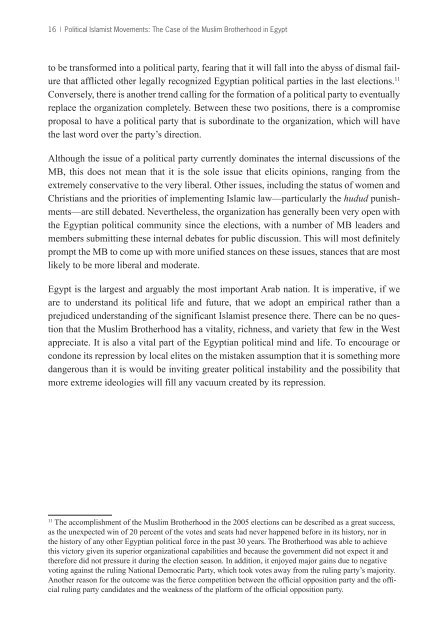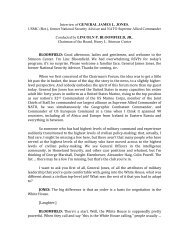Islam and Politics - The Stimson Center
Islam and Politics - The Stimson Center
Islam and Politics - The Stimson Center
Create successful ePaper yourself
Turn your PDF publications into a flip-book with our unique Google optimized e-Paper software.
16 | Political <strong>Islam</strong>ist Movements: <strong>The</strong> Case of the Muslim Brotherhood in Egypt<br />
to be transformed into a political party, fearing that it will fall into the abyss of dismal failure<br />
that afflicted other legally recognized Egyptian political parties in the last elections. 11<br />
Conversely, there is another trend calling for the formation of a political party to eventually<br />
replace the organization completely. Between these two positions, there is a compromise<br />
proposal to have a political party that is subordinate to the organization, which will have<br />
the last word over the party’s direction.<br />
Although the issue of a political party currently dominates the internal discussions of the<br />
MB, this does not mean that it is the sole issue that elicits opinions, ranging from the<br />
extremely conservative to the very liberal. Other issues, including the status of women <strong>and</strong><br />
Christians <strong>and</strong> the priorities of implementing <strong>Islam</strong>ic law—particularly the hudud punishments—are<br />
still debated. Nevertheless, the organization has generally been very open with<br />
the Egyptian political community since the elections, with a number of MB leaders <strong>and</strong><br />
members submitting these internal debates for public discussion. This will most definitely<br />
prompt the MB to come up with more unified stances on these issues, stances that are most<br />
likely to be more liberal <strong>and</strong> moderate.<br />
Egypt is the largest <strong>and</strong> arguably the most important Arab nation. It is imperative, if we<br />
are to underst<strong>and</strong> its political life <strong>and</strong> future, that we adopt an empirical rather than a<br />
prejudiced underst<strong>and</strong>ing of the significant <strong>Islam</strong>ist presence there. <strong>The</strong>re can be no question<br />
that the Muslim Brotherhood has a vitality, richness, <strong>and</strong> variety that few in the West<br />
appreciate. It is also a vital part of the Egyptian political mind <strong>and</strong> life. To encourage or<br />
condone its repression by local elites on the mistaken assumption that it is something more<br />
dangerous than it is would be inviting greater political instability <strong>and</strong> the possibility that<br />
more extreme ideologies will fill any vacuum created by its repression.<br />
11<br />
<strong>The</strong> accomplishment of the Muslim Brotherhood in the 2005 elections can be described as a great success,<br />
as the unexpected win of 20 percent of the votes <strong>and</strong> seats had never happened before in its history, nor in<br />
the history of any other Egyptian political force in the past 30 years. <strong>The</strong> Brotherhood was able to achieve<br />
this victory given its superior organizational capabilities <strong>and</strong> because the government did not expect it <strong>and</strong><br />
therefore did not pressure it during the election season. In addition, it enjoyed major gains due to negative<br />
voting against the ruling National Democratic Party, which took votes away from the ruling party’s majority.<br />
Another reason for the outcome was the fierce competition between the official opposition party <strong>and</strong> the official<br />
ruling party c<strong>and</strong>idates <strong>and</strong> the weakness of the platform of the official opposition party.

















